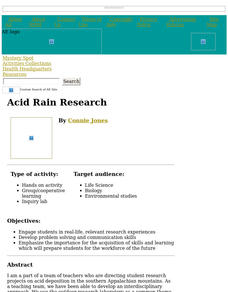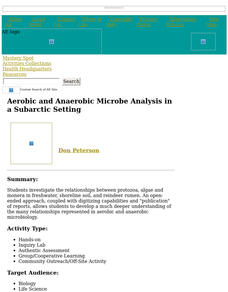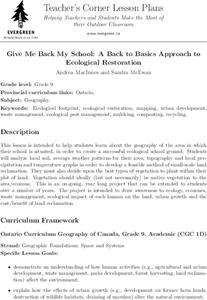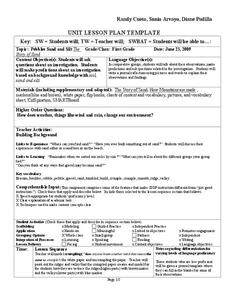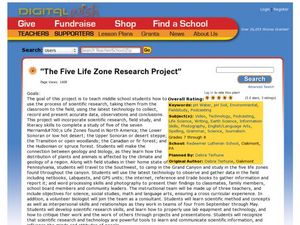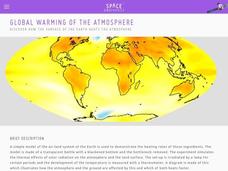Curated OER
How do rice farmers make good use of the land they use for planting rice?
Second graders discuss how farmers grow rice. In this rice growing lesson, 2nd graders see the optimal condition for land in order to grow rice. They experiment with clay and garden soil to see which holds water better.
Curated OER
Acid Rain Research
Students collect samples of rainfall, cloud condensation, and water that trickles through the soil. These samples are tested for pH, conductivity, and the presence of sulfates, nitrates, calcium, and magnesium.
Curated OER
Aerobic and Anaerobic Microbe Analysis in a Subarctic Setting
Students investigate the relationships between protozoa, algae and monera in freshwater, shoreline soil, and reindeer rumen. They publish reports of their findings.
Curated OER
Root, Root, Root for the Nutrients
Students observe the growth of a seed, predict what will happen when seeds are planted without soil, and conduct an experiment using a hydroponics system.
Curated OER
Give Me Back My School: A Back to Basics Approach to Ecological Restoration
Ninth graders research local geography to create successful, ecological school landscaping. They determine soil type, average weather patterns and temperature graphs and use the information to select ideal plants and plant maintenance...
Curated OER
Watercycle
Third graders examine the natural circulation of water from oceans, lakes, and rivers to evaporation into the air, and then to condensation to produce rain falling back to the soil as components of the water cycle.
Curated OER
Reduce, Reuse, Recycle
Fourth graders discover the differences between: reduce, reuse, and recycle by performing hands on examinations. They list what would happen to the soil if we allowed the earth to wash away and briefly discuss the meaning of erosion.
Curated OER
Eye On Conservation Drainage Basin
Students are able to describe the importance of wetland vegetation. They describe the impacts human activities have on water systems. Students compare and contrast the effect of different soil types on water filtration.
Curated OER
Reflection and Absorption of Light
Students use a microcomputer connected to a light sensor and temperature probe to explore the reflection and absorption of radiation for different surfaces. Students follow instructions in this guided inquiry based lab and are then asked...
Curated OER
Sun Seeking Plants
Students investigate the story "The Tiny Seed" by Eric Carle. This story is used to introduce the children to the concept that seeds change and grow into plants when conditions in the environment including temperature, light, water and...
Curated OER
The First Farmers
Students show how constant irrigation, with repeated evaporation of water that left salts in the soil, eventually ruined much farming land in southern Mesopotamia. They discuss the idea that with the development of irrigation people...
Curated OER
Failing Ecosystems: Haiti and the Caribbean
Ninth graders study the impact that climate has on the land. They discuss how deforestation leads to erosion and soil damage and how trees and vegetation help to stabilize the land. They draw a large map of the Caribbean and show Haiti...
Curated OER
Groundwater as Part of the Water Cycle
Ninth graders study the effects of soil and rocks on filtering groundwater. In this groundwater lesson students complete a lab activity that includes sources of contamination.
Curated OER
Water, Water, Everywhere and Always on the Move
Middle schoolers create their own water cycle in a terrarium. In this water cycle lesson, students research the water cycle and complete a worksheet using the Internet. They create a water cycle of their own in a jar with stones, sand,...
Curated OER
Saskatchewan Agriculture: Importance and Impact
Young scholars explore the Saskatchewan farming community. In this agriculture lesson, students have an online discussion about the agriculture in Saskatchewan. They discuss various topics that are related to soil degradation, world...
Curated OER
Unit Lesson Plan Template
First graders listen to the book The Story of Sand and make predictions about an investigation based on soil, sand, and silt. In this sand lesson, 1st graders work in groups to discuss their observations about sand and answer higher...
Curated OER
The Lost Hydroponics Chamber Lesson
Students understand the definition of hydroponics. In this space hydroponics less, students simulate the experiment conducted in space. Students answer questions based on their experiment.
Curated OER
The Five Life Zone Research Project
Students study five of the seven life zones in North America. In this journalism lesson students use the Scientific Method working in teams. They use lab equipment and technology to create a presentation on five of the seven life zones...
Baylor College
Needs of Plants
What better way to learn about plant life than by creating a class garden? Young botanists start with a brief discussion about radishes before planting seeds and watching them grow. To determine the importance of water,...
Outside Education
Handmade Fettuccine
Young chefs engage in an interdisciplinary cooking lesson converting measurements within a recipe, crafting noodles, gathering herbs from the school garden, and making fettuccine for a class luncheon.
Virginia Department of Education
Acid-Base Theory
Litmus paper, why so blue? A chemistry lesson plan includes a pre-lab activity, practice calculating pH, an experiment measuring the pH in acids and bases, a titration demonstration, and a titration experiment.
Space Awareness
Water is a Heat Sink
One of the key objectives of Europe's Copernicus Earth program is to monitor the temperatures of the oceans and seas on Earth. Young scholars learn the effects of different heat capacities through two experiments. These experiments...
Space Awareness
Global Warming of the Atmosphere
Scientists know the amount of carbon dioxide in the atmosphere today is higher than at any point in the last 800,000 years. Scholars learn about the amount of thermic radiation absorbed by air and what happens to the rest of the...
Serendip
Where Does a Plant's Mass Come From?
Where does the mass for a growing tree come from? Scholars consider a few different hypotheses and guess which is correct. They then analyze data from different experiments to understand which concepts science supports.
Other popular searches
- Soil Erosion
- Soil Classification
- Soil Composition
- Soil Fertility
- Soil Conservation
- Soil Animals
- Rocks and Soils
- Soil Erosion Worksheets
- Elementary Science and Soil
- Soil Microbiology
- Plants and Soil Erosion
- Soil Management



